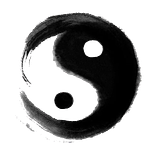
“Pretending to love another human being won't work because loving entails doing it for real. There's no such thing as a loving action, independent of sincerity.”1
This is such an important idea because it also applies self-referentially, meaning:
If you don't sincerely love and accept yourself, it's going to be very difficult to sincerely love anyone else.
I was thinking about this on Wednesday, May 17th, which is the International Day Against Homophobia, Transphobia, and Biphobia. Browsing Twitter, I saw a post that said something to the effect of, “People need to stop saying, ‘Love is love.’ What’s more important right now is protecting trans kids and the hard-won rights and freedoms of 2SLGBTQIA+ people.”
I couldn’t agree more.
Just saying, “Love is love” is meaningless.
It might be well intended, but it's a empty statement — it doesn’t prompt action.
I hate to draw this parallel, but it means as much as “Our thoughts and prayers are with you.” Both lack sincerity. It’s like saying, ‘Oh, I love that.’ You don’t actually love whatever that thing is, rather, you simply like or appreciate it.
To truly love another human being requires conscious, sincere effort.
True love provides moments of joy, happiness, and satisfaction. It can take you to the greatest depths of despair — the absolute opposite ends of the spectrum of what we might call desired emotional states and responses.
Often as human beings, we act in ways that we may regret later on.
Of course, our actions may affect others. But I believe that everyone is — for the most part — responsible for how they feel, react, and how they perceive the world. To blame someone else for how you are feeling gives away all of your power. You get to decide if you're going to allow yourself to feel sad or depressed about how someone has treated you. You get to chose that you’re not going to allow your self-respect to be directed by others.
What matters is not what others think of you.
What matters is how you think about yourself.
If you don't like yourself, you can change.
If you don't like the way your life is right now, you can also change that. Yes, of course, there could be circumstances like economics or ability that make it difficult to change certain things. However, what I'm referring to here is how we think about ourselves and whether we allow ourselves to remain trapped by limited thinking or in negative perceptions of who we are.
If you want people to love and respect you for who you are, or to love and respect you more than what you are currently receiving, you have to do the work to love and respect yourself, first.
Be mindful of how you think about yourself and whether you allow yuourself to remain trapped by limited thinking or negative perceptions of who you are.
You have to be sincere about the actions you take in how you accept yourself, go inward, see yourself for who you are, and take responsibility for all that you see.
This is kind of a tough-love approach, one that I apply to myself. I am cautious with how I give this tough love to a coaching client because I never want this to sound like judgment — because everything is contextual.
We need to look at what's going on in our life and where we're dropping the ball or not pulling our weight. I know I'm using cliches, but when you allow yourself to believe you have no options, or that you're stuck and unable to change, it's because you're choosing to remain stuck — because you've chosen not to change. Or you've decided that even if your life sucks, you're so used to how shitty things are that you don't want to change to become accustomed to a different way of feeling — even if the other side of that would be your ideal life.
This is one of the few times I use the word faith: You must have faith that you are worthwile.
As a human being, you deserve as much dignity and equality as any other.
It vital you understand and belive this statement without justification, merit, credentials, facts, or data from others.
You need to start with the faith that you are good enough, that you are a loving, self-loved human being, and that you can cultivate your own human-heartedness.
“How to set yourself free with ritual.” By Alan Jay Levinovitz





